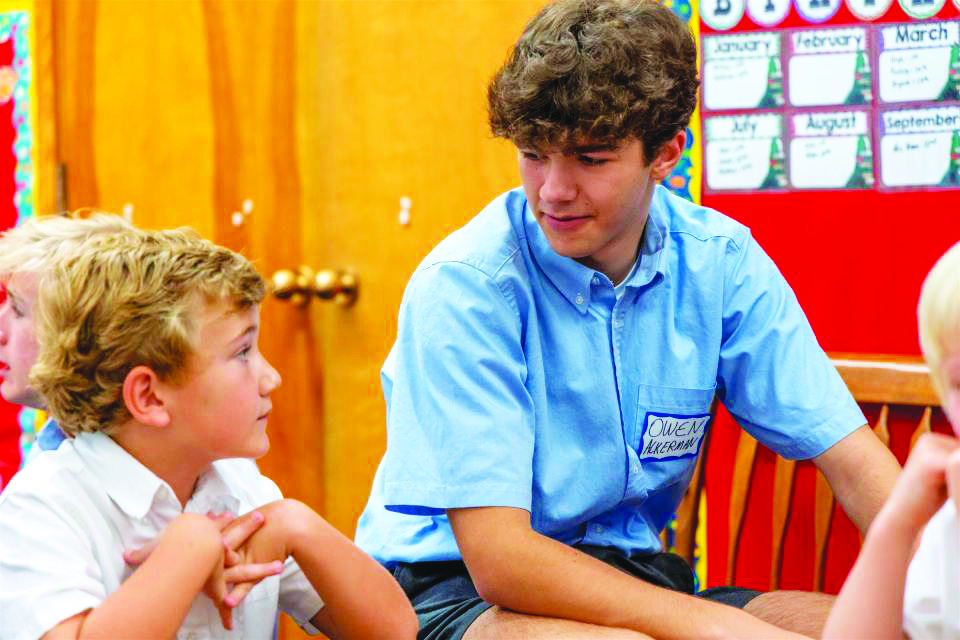
Photo courtesy Development Office
Senior Owen Ackerman hangs out with his little buddy, serving as an example to the young Marksmen, guiding him and often serving as an inspiration when they grow up.
There’s a question that comes up at every family gathering. It comes up in Lower School projects. It’s a question that is implanted in every kid’s brain.
“What do you want to be when you grow up?”
Usually, kids have the same answer—a doctor, firefighter, pro athlete, paleontologist or an astronaut. Senior Daniel Deng was a little different.
“Up until middle school I didn’t really have any career path dreams,” Deng said. “Once I got to like sixth or seventh grade, I really, really wanted to be a math teacher. We had people like Mr. Stanbury and Mr. Hale, and they were absolutely great teachers.”
But when he entered Upper School, Deng’s dream didn’t seem feasible anymore. Math just wasn’t working out for him. However, freshman year also brought a new passion to him: biology.
And in the middle of junior year, a little more than two years later, Deng’s passions seemed to all come together.
For Deng, a lifetime musician and singer, one experience stood out in particular.
While shadowing a doctor at UT Southwestern, Deng found a field of medicine that combined his two passions of biology and music: otorhinolaryngology, a study of ear, nose and throat diseases.
But it was more than just a merging of interests—it was a glimpse of how he could make a real difference. In fact, what struck Deng wasn’t the operation itself, but how the patient reacted afterward.
“I remember the patient getting all emotional after that because it was just such an improvement in her quality of life,” Deng said. “I realized that I wanted to be someone who’s able to use their knowledge to help people in important ways—and that just made me all the more motivated to go down that career path.”
More than everything else, Deng finds his fulfillment in helping others.
“There’s a quote from the greatest showman—from P.T. Barnum—It’s that ‘The noblest act is that of making others happy,’” Deng said. “And I guess both of (my dream) career paths—what they had in common was that their job was to not only teach and not only to cure, but also to make people happy and make people live their lives a little better.”
As Deng looks toward college and beyond, he’s also mindful of making sure the path he follows is truly his own.
“At the end of the day, it’s going to be your life,” Deng said. “The minute you step out of the house and into college, you’re going to realize that you don’t have parents to tell you where to go—and you need to figure out what you want to do. If you’re still going down the path your parents forced you to, you’ll reach a dead end sooner or later.”
Deng’s passion for helping others drives his ambition, but he also recognizes that the journey won’t always be linear.
Rather, that flexibility is part of the excitement for him—because he knows no matter where the path leads, his purpose will remain the same.
“I don’t know where I’m going to be in 15 years. Maybe not even five years. Maybe not even next year. It’s good to have a guess as to where you’re going to be—some sort of framework to follow,” Deng said. “But you shouldn’t be too distressed over little path adjustments that you may take along the way.”
Like with Deng, college counselor Phoebe Butler has seen a number of students change their interests over time, including herself, going from a journalism major to eventually working in college counseling. In her role, she tries to help identify what a person would truly enjoy based on all of the aspects about them.
“I just try to find out who that person is and what makes them happy, because usually money and contentment will come along after that,” Butler said. “I try to help encourage kids to think outside the box, not only in their career, but with what they want for college and what they want for life.”
One obstacle that she sees is students limiting themselves to popular majors like business or medicine, which could be due to reasons like the attention drawn to them, family pressure, or simply a lack of knowledge of available options. To her, the solution lies in asking new questions and digging deeper into a student’s self.
“We see the jobs or the careers that are sexy or that make money, but I don’t think there’s a lot of room for what would make you happy in that conversation,” Butler said. “ But it all really comes down to just getting to know the person.”
She particularly remembers a student who was adamant about studying law in high school, but ended up transitioning to math and finding his passion there.
“He was pretty adamant he was going to go into international things, politics and law,” Butler said. “He told me he was not a math person. But now, he’s applying for PhD math programs. And I was like, ‘how did you get there?’ So once he got to college, he was exposed to law and realized that’s not what he wanted to do. And then he was exposed more to math, and he fell in love with it.”